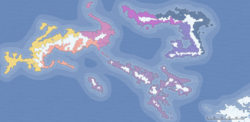Meskangela: Difference between revisions
(Created page with "{{Infobox language |image=Meskangela_dialects.png |imagesize= 250px |name= ''Meskangela language'' |nativename=''| altname = མསྐཾངེལཿ<br />''Mëskaŋelā'''' |...") |
(No difference)
|
Revision as of 10:53, 16 July 2022
| Meskangela language | |
|---|---|
| མསྐཾངེལཿ Mëskaŋelā' | |
 | |
| Created by | Raistas |
| Setting | planet Earth (Europe) |
Sino-Tibetan
| |
Early form | *Proto-Himalayan
|
Meskangela (Classical Meskangela: མསྐཾངེལཿ mëskaŋelā; Western མསྐཾངེལཿ mëskaŋela; Eastern མསྐཾངེལཿ mëskoŋeła; Southern མཁཾངྃགཾ măkhoŋego) is a Himalayan language of an unknown origin. The most common hypothesis suggests its origin in the West Himalayan region and migrated westward over the period of three thousand years. For a millennium, Old Meskangela served as a language of public life and administration as well as a language of divine worship. The Classical Meskangela (also known as “Meskangela Proper” མསྐཾངེལཿ རནཏཾཀེ Meskangela Rántake) was a standardised dialect that emerged from Old Meskangela in approximately 300 BNE and remained spoken until the New Era, after which it remained only a written standard, as local dialects gained more recognition and prominence. Seven dialects are still spoken, but only the Southern variety diverges from the classical spelling and uses its own modified version of the Meskangēl script.
New Meskangela dialects are written in the Meskangēl script, a descendant of the Ancient Himalayan script, and the classical variety remains most prominent. The earliest inscriptions date from 13th century BNE, although such inscriptions remained scarce until approximately 500 BNE, when first religious texts were written. However, the linguistic history of Meskangela prior to the appearance of such textual sources remains unknown.
Name and origin
The name of the language was coined during the classical period from the word སྐཾང་ skaŋ “mountain” and means “pertaining to the mountains”, since the land where it was traditionally spoken is mountainous. Other groups used different terms to refer to themselves and their languages: མྸཾཨྃལཿ mágailā “Southern”, སྱ྅རེལཿ syörilā “Western”, ཀལོནེལཿ këlónelā “Plain dialect”, ཁམེལཿ khëmelā “Coastal dialect”.
Historically Meskangela had always been the language of the mountainous islands.